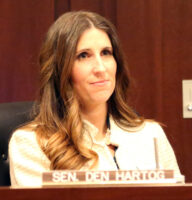A rare, contested Senate primary race in Ada County features a rematch of a close 2014 contest.

Once again this year, Sen. Lori Den Hartog, R-Meridian, and Charles Pratt Porter, R-Kuna, are squaring off for the Republican nomination for the District 22 Senate seat.
The first time the two clashed, Den Hartog prevailed by 253 votes.
Porter said he is running again because of the support he received two years ago.
“I consider myself a concerned citizen and after looking at the way our country has been going I want to ensure our freedoms are preserved for my children and your children and our grandchildren,” Porter said.
Porter pledges to run a campaign accountable to the taxpayers, and he says the proliferation of local school districts’ supplemental levies has him concerned.
“Funding has got to come from the state rather than them trying to rob their neighbors all the time,” Porter said.
With her young family and background in land use and transportation issues, Den Hartog originally ran because she felt values like hers weren’t adequately represented in the Statehouse.

“I bring a different perspective and a different voice and I have that experience working in the public sector,” Den Hartog said.
If her re-election bid is successful, Den Hartog promises to fight for school choice and to be involved with reworking Idaho’s school funding formula.
“I hope we get closer to a model where the money follows the child,” Den Hartog said. “How that relates to school choice is by empowering parents to find a school that fits their child’s needs.”
A third GOP candidate, Robert “Ernie” Terrell, has filed for the race, but has not returned numerous phone messages left by Idaho EdNews dating back to April 21. The Idaho Statesman reported Terrell is no longer running an active campaign.
No Democrat or third party candidates have filed to oppose the winner of the May 17 Republican primary.
The race:
Republican primary: District 22 Senate
Candidates:
Lori Den Hartog (www.lorifor22.com)
Charles Pratt Porter (www.porterforidaho22.com)
Robert “Ernie” Terrell
How long have you lived in your legislative district?
Den Hartog: Born in California, raised in rural Ada County.
Porter: Twelve years.
Education:
Den Hartog: Bachelor’s degree in business and public administration, Dordt College, Sioux City, Iowa.
Porter: Bachelor’s degree in business marketing, California State University Fresno.
Political Background:
Den Hartog: Served one term in the Idaho Senate, elected in 2014. Den Hartog’s father is Rep. John Vander Woude, R-Nampa.
Porter: Ran unsuccessfully for the Senate in 2014, losing to Den Hartog.
Who can vote: Registered voters within District 22, which is located within Ada County and includes Kuna. Check this map for details.
Election date: May 17.
Education connection: Den Hartog sits on the Senate Education Committee.
Before you vote: Double check whether you are registered and the location of your polling place.
Do you support the 2016-17 public school budget passed by the Legislature this year? Why or why not?
Den Hartog: “I supported it, I voted for all the different components and definitely support the investment we made into career ladder for our teachers and am glad we got the pupil services staff on to that. I think that was valuable. I think we have to be cautious as we move forward — not just with the education budget, but all state budgets. We’re starting to see the economy is growing, seeing increased revenues into the state. We just need to be cautious at what rate we are increasing all of our budgets because the increase to the overall budget was greater than the percentage increase in economic growth in the state. That to me is kind of an alarm bell, and the public school budget is the biggest portion. That is something we have to pay attention to.”
Porter: “If I’m not mistaken, 60 percent of the state budget, I believe, is dealing with support of education. Sixty percent of the budget in Idaho, which is a significant portion. But I do believe that Idaho education is best served by the state stepping up and fully funding education. The money should come from the state budget, then be turned over to the school districts to do their budgeting and live within their budget. My problem, I’m always concerned, is when (education) is not really supported and funded, then we do the whole levy thing. Unfortunately, it’s a terrible, ugly process that divides the community and forces neighbors against neighbors. Then people get painted like they don’t like people if they are opposed to a levy. One would think they don’t like children, like they don’t like flowers or puppies or something like that. I think the levy process is ugly and very inefficient. The state needs to step up and fully support education and those budgets are needed. They should be a priority. In the Constitution it is perfectly clear the state is supposed to step up and provide for education.”
Explain why you support or oppose implementing all of Gov. Butch Otter’s Task Force for Improving Education recommendations over the next three years.
Den Hartog: “The majority of the recommendations themselves I don’t have an issue with. It becomes really important in detailed policy just how we implement them. There is the goal of making college more affordable, while the specific policy of tuition lock I don’t support. When you get into the nitty, gritty detail it matters. One I still take issue with — and we’ve been pushing back, but not to a great degree this legislative session — is our Core standards. As much as we want to say they are Idaho standards, they are pretty much Common Core standards for the most part. The part I have a real problem with is we are testing our kids so much, and not for the purpose of improving education. We’re testing them for the purpose of comparing them to other students in Idaho and across the county. It doesn’t mean a whole lot to their teachers and that’s frustrating to me.”
Porter: “I haven’t read the entire task force particulars. But I’m aware it was several years ago they put it together, and much of it was kind of a wish list, if I’m not mistaken. Teachers think it was the last five-to seven-year plan they put together. I can’t say that oh yeah I agree with every one of them because I don’t know every one quite honestly. But if there are some particular issues, one issue that was always a big one has been teacher pay. Teachers have every right to make money just like everybody else. If there is an incentive to offer them that fundamentally make the product, which is our children, better students and more successful students, then I’m all for that. Teachers have got a tough job, lets face it. Not all teachers have the same group of students. Just like business, if they have different accounts. The problem is some teachers have a better performing group. Whereas others have kids in special education — that’s a labor of love. If merit pay can be equitable and fair, I guess the devil is in the details. We have to find a way to be fair about it and not punish the teachers. They’ve got the toughest job.”
State leaders are promoting a goal of having 60 percent of the Idaho’s young adults hold a postsecondary degree or certificate by the year 2020. What is your position on this goal?
Den Hartog: “I think it is a big and lofty goal. From all that we hear from the business community, it’s necessary. We hear that’s what we need for our future workforce, and we focus a lot on the college portion of that. But I don’t think we’re focusing on the alternative paths. That’s something I’d like to see us work on. I think here is where strategic investment makes sense. I’m thinking of college and career counseling making an impact at the high school level and not trying to pigeon hole kids into thinking only going on to a four-year college is the right choice. The 60 percent goal is good, but I’m not sure we can get there (by 2020) but we can’t give up on it either. It’s what our businesses and companies need to be able to thrive and flourish and stay in Idaho.”
Porter: “If you’ve read the paper recently or seen stuff on the Internet, the big question is — is paying for college worth it? I think it’s a fair question, it really is a fair question. Look at our markets and what has gone on. If they have a certification in a trade I think that would be a good system for Americans. If you have that trade and you go to college, you always have something to go back on. You know and I know life is what happens to us when you are not expecting it. In regards to having higher education or not, if your job changes, or whatever, you can go back to that fundamental trade. It’s a safety net. I think that is wise and prudent to have. Should everybody go to college? I say absolutely not. A lot of people out there I don’t think it was necessary to go to college, but it was necessary to teach them a certain trade. I encourage everybody, at a bare minimum, to have a trade, even people in college.”
This year the Legislature passed two bills and set aside $9.1 million in new funding in an attempt to improve the literacy rates of struggling readers in grades kindergarten through third grade. What is your position on this program?
Den Hartog: “One of the things that strikes me is that right now we have 36,000 kids who aren’t reading at grade level. We failed those kids. That breaks my heart. That is fundamental to everything else. It’s no wonder we see them struggling yet moving forward if they’re not where they should be with reading. So, to me, this was one of the most important things we did this session. This is one where I am excited to see what our school districts and individual schools will do. It was important to have that increased investment there, but we will be watching to make sure that increased investment gets us what we’re looking for. We need to be cautious. We’re not just throwing a lot of money into different types of things.”
Porter: “Absolutely, the literacy rate is obviously critical. I’ve seen those commercials, and I don’t know who put them up, saying Idaho is falling behind. And you know, we see this in pockets. If the commercial is correct and Idaho is falling behind, then obviously we need our students to be able to read and write. If we see a deficiency in literacy rates, then surely we have to step in and find some corrective legislation to remedy it. I went to school in Nebraska and California and California threw a lot of money at a lot of things for whatever reason and it didn’t seem to improve the situation. Fundamentally, it comes down to individual people and individual families and the type of culture within families to encourage kids to try to excel and learn.”
Further reading
- Check Den Hartog’s voting record on education issues by scrolling through EdNews’ Bill Tracker.
- May 10: District 15 House Seat B, Beck vs. McDonald.
- May 5: District 30 House Seat B, Horman vs. Neal.
- May 4: District 14 House Seat B, DeMordaunt vs. Jones.
- April 26: District 34 House Seat A, Nate vs. Ricks.
- April 20: District 9 House Seat B, Boyle vs. Dolton.
- April 18: District 9 House Seat A, Kerby vs. Stephens.
- April 11: District 4 House Seat A, Macomber vs. Malek.
- April 5: EdNews’ campaign kickoff article.
